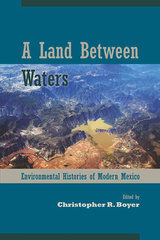
312 pages, 6 x 9
16 b&w illustratons, 2 maps, 6 tables
Hardcover
Release Date:24 Nov 2020
ISBN:9780816541126
Mexico’s Community Forest Enterprises
Success on the Commons and the Seeds of a Good Anthropocene
The University of Arizona Press
The road to sustainable forest management and stewardship has been debated for decades. Some advocate for governmental control and oversight. Some say that the only way to stem the tide of deforestation is to place as many tracts as possible under strict protection. Caught in the middle of this debate, forest inhabitants of the developing world struggle to balance the extraction of precarious livelihoods from forests while responding to increasing pressures from national governments, international institutions, and their own perceptions of environmental decline to protect biodiversity, restore forests, and mitigate climate change.
Mexico presents a unique case in which much of the nation’s forests were placed as commons in the hands of communities, who, with state support and their own entrepreneurial vigor, created community forest enterprises (CFEs). David Barton Bray, who has spent more than thirty years engaged with and researching Mexican community forestry, shows that this reform has transformed forest management in that country at a scale and level of maturity unmatched anywhere else in the world.
For decades Mexico has been conducting a de facto large-scale experiment in the design of a national social-ecological system (SES) focused on community forests. What happens when you give subsistence communities rights over forests, as well as training, organizational support, equipment, and financial capital? Do the communities destroy the forest in the name of economic development, or do they manage them sustainably, generating current income while maintaining intergenerational value as a resource for their children? Bray shares the scientific and social evidence that can now begin to answer these questions. This is an invaluable resource for students, researchers, and the interested public on the future of global forest resilience and the possibilities for a good Anthropocene.
Mexico presents a unique case in which much of the nation’s forests were placed as commons in the hands of communities, who, with state support and their own entrepreneurial vigor, created community forest enterprises (CFEs). David Barton Bray, who has spent more than thirty years engaged with and researching Mexican community forestry, shows that this reform has transformed forest management in that country at a scale and level of maturity unmatched anywhere else in the world.
For decades Mexico has been conducting a de facto large-scale experiment in the design of a national social-ecological system (SES) focused on community forests. What happens when you give subsistence communities rights over forests, as well as training, organizational support, equipment, and financial capital? Do the communities destroy the forest in the name of economic development, or do they manage them sustainably, generating current income while maintaining intergenerational value as a resource for their children? Bray shares the scientific and social evidence that can now begin to answer these questions. This is an invaluable resource for students, researchers, and the interested public on the future of global forest resilience and the possibilities for a good Anthropocene.
At a time when climate change, deforestation, and rural poverty have emerged as global scourges, Mexico’s Community Forest Enterprises examines how forest communities in Mexico beat the odds by forming grassroots timber companies capable of managing collective resources and sustaining livelihoods. David Barton Bray brings decades of research to bear in this comprehensive examination of the theory and practice of common pool resource management in Mexican forests. The result is an indispensable study of how the interaction of institutions and social capital can address some of the most intractable challenges facing the world today.’—Christopher R. Boyer, author of Political Landscapes: Forests, Conservation, and Community in Mexico
‘Mexico’s Community Forest Enterprises is the culmination of a lifetime of research on how community forests in Mexico are successful and why some of them fail. Bray captures the complexity of Mexican forestry in a masterful way. Amidst all the negative news about global deforestation, Bray makes a compelling case for understanding the stories that we don’t get to hear much on the media, the success of common property regimes in Mexican forests can be a source of hope to the future of community forests.’—José E. Martínez-Reyes, author of Moral Ecology of a Forest: The Nature Industry and Maya Post-Conservation
David Barton Bray is a professor in the Earth and Environment Department at Florida International University. He received his PhD from Brown University in 1983. He is the lead editor of the book The Community Forests of Mexico and is widely published in academic journals and in popular outlets such as the New York Times and the Miami Herald.











